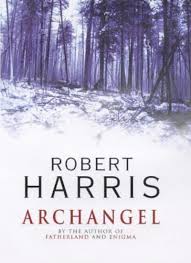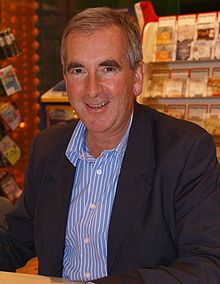Good Reads meta-data is 432 pages rated 3.8 from 7906 litizens.
Genre: Fiction

Verdict: Meticulous and engrossing.
Soviet historian Robert Kelso delivers a keynote address at a conference in Moscow circa 1996. He is jaded; he is cynical; he is bored; he is a high diver. He graduated from the best universities and published well-reviewed books and then….. He went from a promising young man to a bitter middle aged one. Still the conference sponsor paid his way to Moscow and put him up in a posh hotel to make snide remarks about the work of others, so there he is.
Then a blast from the past knocks on his hotel room door. Not his past but the P A S T. Papu was one of the lowly guards when Stalin died and he says there was this notebook. In return for all the alcohol in the hotel room mini-bar Papu tells Kelso the notebook was buried in the grounds so explosive was its contents. After his middle-aged bladder takes Kelso to the toilet he returns to find Papu gone.
In the haze of a hangover the next morning, Kelso sees in this story an opportunity to jump start his stalled career. He will find Stalin’s testament, translate it, interpret it, publish it and return to the fast track of the main game.
There are a couple of problems to deal with. First is finding Papu. Second is funding anything since his personal credit cards are maxed. Third, he is not good at keeping things to himself.
Still Papu could almost be followed by his body odour. Meanwhile, Kelso tries to verify aspects of his story with some library and archival research which he used to be good at, which he used to enjoy, which he still knows how to do. But merely by consulting the sources, he leaves a trail were anyone watching, and in Russia there is always someone watching.
He crosses paths with a dedicated Old Stalinist who scares him. Indeed this Stalinist seems to have his own army. He is purposeful, organised, efficient, and surrounded by dedicated followers.
Then a journalist enters the equation. Talk about loose lips. This guy cannot shut up. Soon every one is after that testament. Even the vodka-soaked President in the Kremlin, Boris, wants it, and sends a hapless secret policemen after it in competition with the Stalinist, the historian, the journalist, and who knows who else. It is not a secret well kept.
The trail leads north to the title city, and in the forests primeval there Kelso and the others find much more than they bargained for. It was a testament alright, but not the kind most of them had anticipated. Let’s just say it harks back to an earlier, passing remark about Trokhym Denysovych Lysenko.
I liked the portrayal of the ever so polite academic backbiting at the conference for its realism. The characterisations of all the players were superb from the law student daughter to the crazed Stalinist and the dutiful secret policeman who discovers that the water is far too deep even for him, and most of all the bullies from Special Operations (code for Death Squad). I also liked the archival and library work. Strange, no?
I also liked the idea that the Stalinist was the puppet master using the avaricious journalist, Kelso, and others for his own ends from the get-go.
But I am not sure what to make of the implicit ending. Would a Marakov really settle things?

Robert Harris has a long list of splendid novels based on historical incidents.
I am pretty sure I read this at the time of publication but none of it came back while it read on the Kindle.
Skip to content
